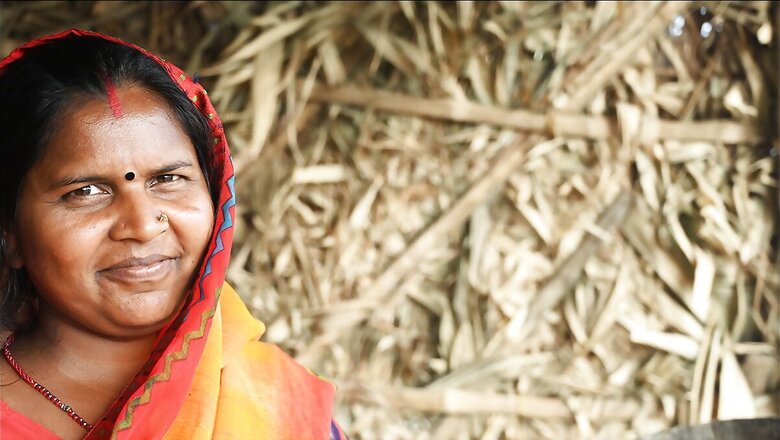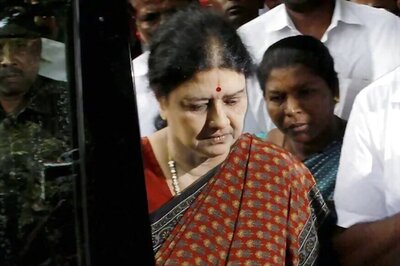
views
India is a land of powerful stories. From our rich history, to our mythological epics, to the incredible story of Indian independence. In our most beloved stories, the underdogs fight evil, dig deep to find strength and courage, and emerge victorious not just for themselves, but for the whole community.
What makes these stories memorable are the almost insurmountable difficulties and setbacks the heroes face. In real life, we don’t have to look far to find them. These heroes are unsung, but no less heroic.
Asha Kandara: From Sweeper to Deputy Collector
Asha Kandara’s story is one of sheer grit. Hailing from Jodhpur, Rajasthan, she began her career as a sweeper in the Jodhpur Municipal Corporation. Abandoned by her husband eight years ago, Asha found herself a single mother of two children.
However, she refused to let her circumstances define her destiny. Embarking on a journey of education, she proudly completed her graduation in 2016. What drove her was her commitment to raising her children on her own, and to do so well, she needed a better job.
She faced caste discrimination and gender bias, but Asha Kandara fought for and won a job in the municipal corporation. Today, she stands as a Deputy Collector, exemplifying that with unwavering determination, one can overcome any challenge and achieve financial independence.
Usha Chaumar: Padma Shri Awardee
The story of Usha Chaumar, a former sanitation worker who received the Padma Shri award for her work in uplifting women in sanitation, is the stuff of legends. Today, she is the President of Sulabh International Social Service Organisation, the non-profit arm of Sulabh International, but that wasn’t always the case.
She began cleaning toilets at the tender age of 7, earning a mere ₹10 per month from each household. Her life changed when she met the founder of Sulabh International, Dr. Bindeshwar Pathak, who encouraged her to join the NGO Nai Disha, in search of a more sustainable lifestyle.
In addition to the work she has done in inspiring and enabling thousands of other sanitation workers like herself, she has also been able to create a much better life for her own family – her oldest son is pursuing a postgraduate degree, something she knows he wouldn’t have had access to, without the choices she made.
Sushila Sable: Sustainable Development Leader
Sushila Sable’s story is one of environmental stewardship and economic empowerment. Growing up in Mumbai, Sushila worked as a waste picker alongside her mother. However, she was determined to make a difference and improve her income.
Through a local community-based organisation, Sushila learned about proper waste segregation and income enhancement through waste collection. With unwavering determination, she initiated the formation of self-help groups (SHGs) and devised income models for waste collection and segregation.
Her work not only contributed to environmental preservation but also created sustainable livelihoods for many women. Sushila’s commitment to sustainability earned her recognition as a United Nations honoured sustainable development leader.
Venkatalakshmi: Trailblazing in Desludging
Venkatalakshmi, hailing from Narsapur, Andhra Pradesh, defied societal expectations and gender norms to become a trailblazer in desludging. Her journey was far from conventional, as she hailed from a tribal community where employment opportunities for women were limited.
Initially, Venkatalakshmi assisted her father in operating desludging trucks. When her husband fell ill due to alcohol consumption, she took up the operations of the family’s desludging business. With remarkable courage, she secured loans, hired drivers, and painted the trucks to make them more appealing.
Overcoming scepticism from her community and households about women entering traditionally male-dominated roles, Venkatalakshmi persevered. Her dedication and commitment gradually built her reputation and business, shattering gender norms.
Vandana U. Gaikwad: A Journey of Empowerment and Transformation
Vandana U. Gaikwad, at the age of 32, has a story that epitomises resilience and empowerment. Marriage at a very young age thwarted her educational aspirations, despite being an excellent student. Due to the family’s dire financial situation, she undertook work as a toilet cleaner at the local police station. At that time, Vandana believed this was the best she could do, that these were the only opportunities available to her.
However, Vandana’s life underwent a significant transformation through her training at the Harpic World Toilet College. The skills she acquired not only improved her technical abilities but also honed her soft skills. Despite continuing to work at the police station as a cleaner, Vandana took on an additional and highly significant role. She became responsible for counselling family violence-related cases at the police station.
Vandana’s impact extended beyond her immediate surroundings. She played a pivotal role in changing her brother Ratan’s fortunes. Inspired by Vandana’s journey and her dedication to social betterment, Ratan became a mobiliser for the Harpic World Toilet College. Not stopping there, he went on to complete his Masters in Social Work too.
Education: The Game Changer
As India’s leading brand in the lavatory care space, Harpic has a keen understanding of the problems that sanitation workers face – at work, and outside. This intention is what powered the creation of Harpic World Toilet College (HWTC) in 2016.
HWTC was established with the stated objective of improving the quality of life of sanitation workers through their rehabilitation by linking them with dignified livelihood options. Workers trained by the college are provided placement with various organisations. Following the successful proof of concept in Rishikesh, HWTCs have opened in Maharashtra, Aurangabad, in partnership with Harpic, Jagran Pehel and Maharashtra Government.
As Vandana’s story shows, Harpic World Toilet College is not just about teaching sanitation techniques; it’s about fostering holistic growth. The curriculum is designed to actively contribute to the personal growth and development of women sanitation workers.
For Harpic, the establishment of HWTC is just one part of the larger program to build awareness around toilet access, toilet hygiene, and the upliftment of the sanitation workers who form the backbone of our sanitation efforts. Three years ago, Harpic joined hands with News18 to create Mission Swachhta aur Paani, a movement that champions the cause of inclusive sanitation, equality for all genders, abilities, castes and classes and the strong belief that clean toilets are a shared responsibility.
Through Mission Swachhta aur Paani, we’re bringing you these magnificent stories of everyday, unsung heroes. We’re doing this because we all play a part in their stories. The adversities they face, particularly the social stigma and discrimination, comes from us. Society is us. Are we ready to change?
It’s time. Join us here, to learn how you help make a more just, equitable, Swachh and Swasth Bharat.




















Comments
0 comment